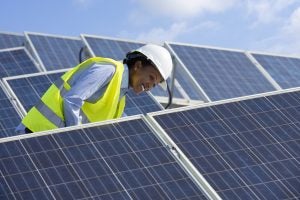 By Christie Hicks and Andrew Barbeau
By Christie Hicks and Andrew Barbeau
This post is the second in our CEJA series.
Illinois has once again put itself at the forefront of the movement to promote a clean energy economy. In March, we wrote about the Clean Energy Jobs Act (CEJA), a groundbreaking bill that Environmental Defense Fund was proud to play a central role in developing.
Like its predecessor, the Future Energy Jobs Act (FEJA), CEJA recognizes that growing the clean energy economy is not just a core solution for climate change. It can also be a vehicle for expanding equitable access to quality jobs, economic opportunity and wealth creation — especially in economically disadvantaged communities and communities of color that have borne the heaviest burden of dirty fossil fuel pollution.
Simply put: jobs, equity and economic justice are at the core of this legislation.
Clean Jobs Workforce Hubs
By creating a network of frontline organizations, Clean Jobs Workforce Hubs would provide direct and sustained support for members of economically disadvantaged communities, environmental justice communities, communities of color and displaced fossil fuel workers.
These prospective workers will become part of a pipeline for clean energy jobs in solar energy, wind energy, energy efficiency, electric vehicles and other related industries.
The Clean Jobs Workforce Hubs create a broad continuum of support ranging from basic education and recruitment through labor, training and apprenticeship programs. Along the way, participants will be eligible for stipends and other funding that will help them access necessary items like tools, boots and even childcare.
Jobs, equity and economic justice are at the core of new Illinois Clean Energy Jobs Act Share on XWhen participants graduate, the program will help navigate a new and complicated construction market with ongoing and sustained career placement and case management support.
It’s important that these hubs are developed broadly across the state and in partnership with a cohesive cross-sector clean jobs curriculum that incorporates some of the basic job skills, math skills and technical skills that workers will need to excel in the clean energy industry.
Equity in hiring for clean energy jobs
Also at the core of what is proposed in CEJA is a strong commitment to enforce equity in hiring for people who install solar, wind or energy efficiency. It means ensuring there is preference for hiring those who graduate from the Clean Jobs Workforce Hub program. Companies that use subcontractors or vendors will also be held to those standards. Firms working on larger projects, a community solar installation, for example, can achieve these actions by entering into project labor agreements or community benefit agreements.
The bill is not limited to identifying new ways for people to get hired. It focuses on entrepreneurship as much as on employment.
The bill would also create new tools to provide access to low-cost capital through the state. A Contractor Incubator program will develop on-the-ground training support and direct opportunities for new businesses in communities that need them most. Insurance, bonding and other financial requirements, and business management and development support are also addressed.
Finally, the bill proposes a five-fold expansion of Illinois Solar For All, a groundbreaking program created under FEJA that promotes equitable access to the solar economy and creates jobs in both rural and urban communities.
The bill may be called the Clean Energy Jobs Act, but equity and opportunity run through each discrete program the bill will create. CEJA is not just about renewable energy. It will also ensure that all of Illinois shares in the gains clean energy will bring.









